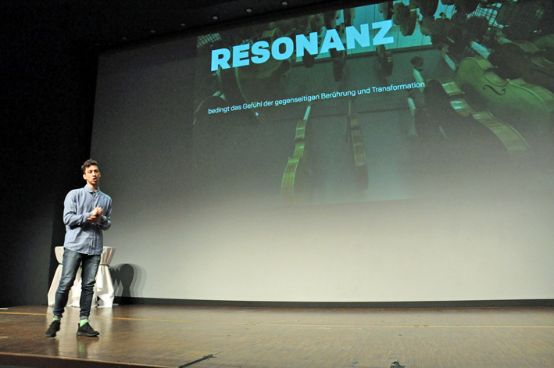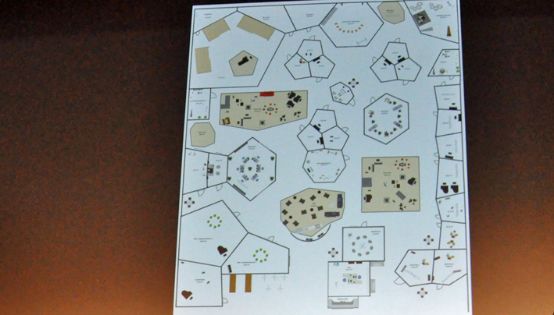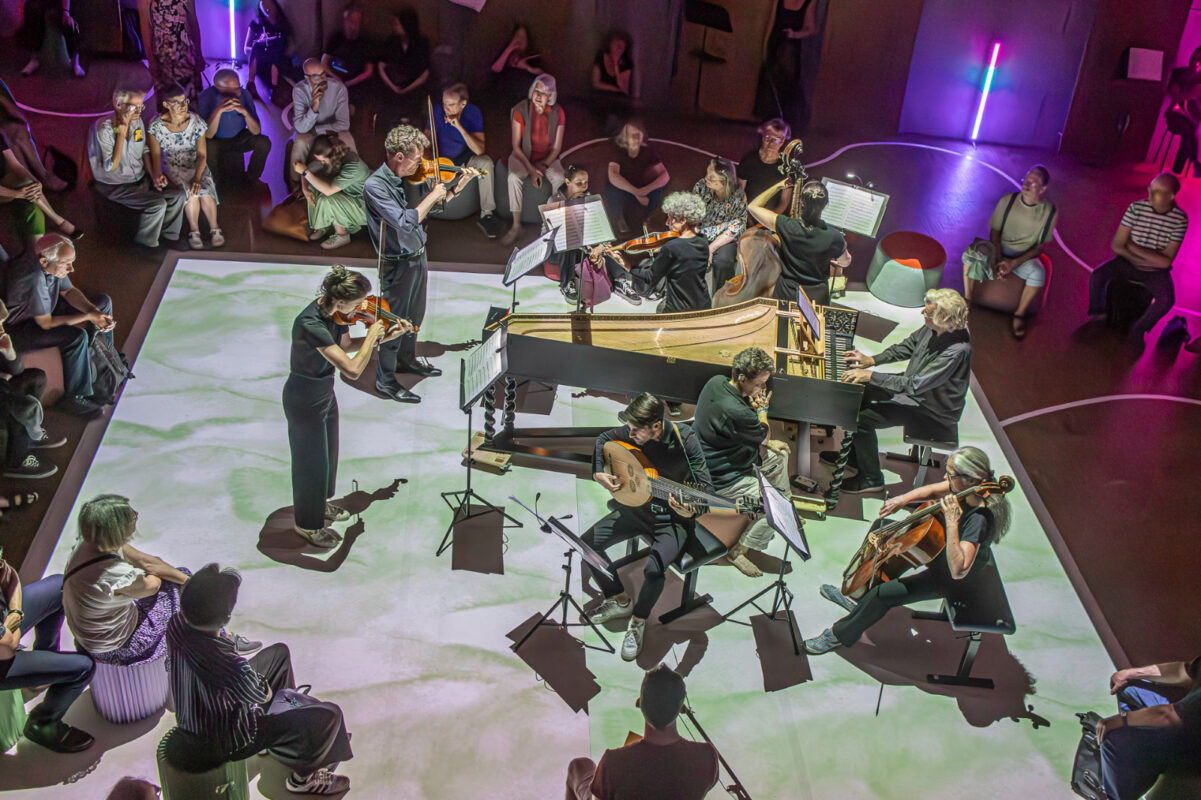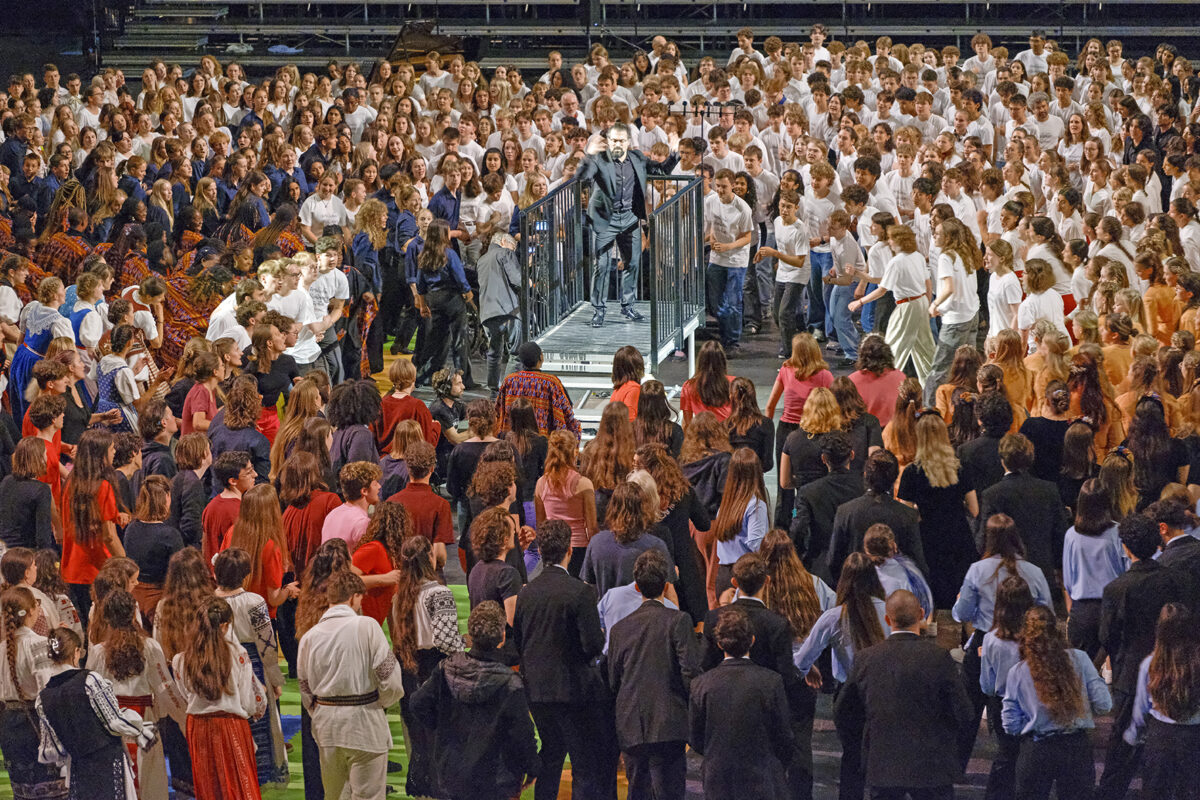View over the Gartenhag
This year's Forum Musikalische Bildung (FMB) focused on the topic of "Change: opportunity or threat". Background knowledge, exchange and innovation proved to be a means of making a positive contribution.

Joël Luc Cachelin says you don't have to go along with everything. Photo: Niklaus Rüegg
The megatrends of age, migration and digitalization are changing our lives. Looking at them in conjunction with music education innovation attracted a record number of visitors to the VMS symposium: On Friday, January 19, 230 participants made their way to the Trafo in Baden, followed by another 190 on Saturday.
The essence of the two intensive days could be this: Those who set out on the path perceive change as liberation - those who close their eyes to it as a threat. Change can mean a new beginning, but it can also be dangerous if it happens too quickly or in the wrong direction. The audience was made aware of this when it came to digitalization, which is now almost synonymous with change: "You don't have to go along with everything, but you do have to examine which networking technologies have which advantages and disadvantages," was how thought leader Joël Luc Cachelin put it.
The "old ones" kick things off
The Baden Seniors' Orchestra with soloist Michelle Süess (trumpet) provided a harmonious musical prelude with works by Mozart and Friedrich Dionys Weber. On the second day, it was the turn of Trio Dolce Vita, winner of 1st prize with distinction at the Swiss Youth Music Competition and the VMS special prize. The trio, consisting of recorder, violin and cello, delighted the audience with pieces by Frescobaldi, Telemann and Matteis.
The Duo Calva needs no further introduction. With a witty show and breathtaking virtuosity, they proved that classical music and humor need not be mutually exclusive.
Jonathan Bennett, Professor and Head of the Institute of Ageing at Bern University of Applied Sciences, spoke about a relatively new market, music lessons for older people. He presented the results of his study on the needs, objectives and limitations of music lessons for older people from the perspective of pupils and teachers. The motives of older people who are willing to learn are just as varied as their biographies. Bennett describes the lowest common denominator as follows: "Everyone is aware of what needs they want to satisfy." In the classroom, older people are demanding and critical, even of themselves. They want to understand and not just do. Teachers should therefore play more of a questioning, guiding and explaining role.
Other countries, similar guidelines
The President of the Swiss Association of Music Schools, Christine Bouvard, was particularly keen to give her German-speaking neighboring countries the opportunity to present their own music school traditions. She invited Michaela Hahn as a representative from Austria. The managing director of "Musikmanagement Niederösterreich", the central competence center for the music school system, spoke about the structure and tradition of extracurricular music education, the goals and strategies of KOMU (Conference of Austrian Music Schools), the broadest possible access to music education and offers for talents.
Ulrich Rademacher, Professor of Song Interpretation and Chairman of the Association of German Music Schools (VdM), emphasized the values of music-making in his speech, but also stressed the importance of appropriate working and employment conditions for teachers. The VdM's mission statement for public music schools is regarded as the basis of German music school work. It sets out guidelines for music education that do not differ significantly from the Swiss principles, except perhaps in terms of the importance of the framework curricula.
Promotion of innovative projects
The seven project entries selected for the second VMS Best Practice Competition showed in an exemplary way how new paths can be taken in music education in an imaginative and future-oriented way - for the benefit of schools and pupils.
First prize went to the Image & Sound department for a cooperation project between the Basel Music School and the K'Werk of the Basel School of Design. The Allgemeine Musikschule Oberwallis (amo) and the Zeughauskultur Brig (ZHK) were awarded second prize for their interdisciplinary joint project "Culture for the little ones and their companions". The Lucerne Music School came third on the podium with "Musikschule auf Reisen - zu Besuch im Schulhaus". The Audience Award went to the École de musique Bienne / Université populaire Bienne-Lyss for "Initiation musicale pour enfants issus de la migration". The music schools of Bern, Oberland Ost and Schüpfheim were also in the running with remarkable entries. Jodok Kobelt wittily hosted the presentation.
Selected projects will be presented in detail on the VMS Association website in the coming months.
Everything is getting better - but not for everyone
The charismatic Swiss sociologist Ueli Mäder built on a socially liberal world view in his input presentation "Social change: migration and integration": "Integration is a process in which everyone moves." Dealing with migrants is not about understanding, but about accepting the foreign, about coming to terms with what is different and with the foreign in ourselves. Mäder explained how our world functions politically, socially, economically, socially and educationally and how these sub-areas develop with and against each other. He eloquently drew a picture of opposing trends: A few get richer and many others have to spell back. He described the educational model of the post-war period as "behaviorist". In the seventies, educators had to learn to argue, but today a return to mechanistic recipes can be seen.
At a time when economism prevails, music lessons are becoming increasingly important because they promote sensory perception and togetherness. Instead of globalization, which is only economically oriented, Mäder would rather see a "globalization" that also includes social and cultural areas.
Joël Luc Cachelin reassured those who fear digitalization. According to the so-called "Oxford Study", around half of our jobs are likely to be eliminated by computerization and robots in the next 20 years. Three fields of activity are listed that cannot be replaced by machines. These include professions that have to do with "perception and manual skills", "social intelligence" and "creativity" - these are precisely the things that make up music-making, Cachelin noted. "Work that brings joy to others is never under threat," he reassured. Ultimately, it's about finding an attitude towards digitalization, coming to terms with it and making intelligent use of the new opportunities.

Music village: This is what a music school as a place of learning could look like according to Andreas Doerne and Stefan Doeritz. Photo: Niklaus Rüegg
Music school as a place to learn music
"What does the music school look like that we would have liked to go to ourselves?" This was the premise of the two teachers Andreas Doerne and Stefan Doeritz from the Freiburg/Br. music academy. They were guided by the basic idea that the traditional music classroom should be transformed into a place of learning where different forms of learning are possible. The two started with the architecture of what they saw as an ideal music learning space, inspiring the imagination of those present with a virtual tour of a "music village" with paths, glazed, bright, separate and multifunctional rooms. The floor plan was designed to invite people to linger, facilitate spontaneous contact and encourage communication. Particularly noteworthy was the "Silent Arena" with musical instruments that can be practiced silently. Stefan Goeritz has already implemented some of these ideas at his music school in Waldkirch. The usual question and answer session after the lecture was replaced by a text messaging service - a clever idea to involve the audience in the discussion.
The 9th FMB will take place again in Baden on January 17 and 18, 2020.
The Schweizer Musikzeitung is a media partner of the FMB.








